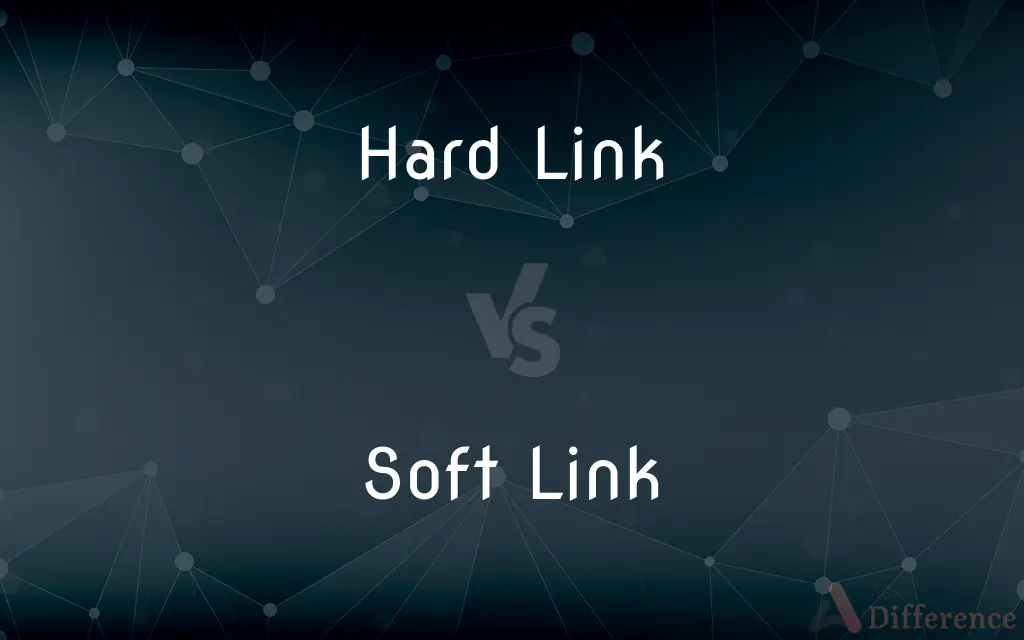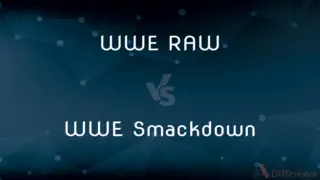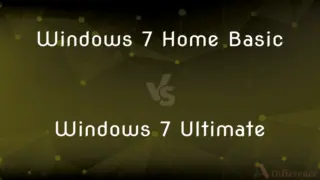Hard Link vs. Soft Link — What's the Difference?
By Tayyaba Rehman & Urooj Arif — Published on February 6, 2024
A hard link in file systems refers to a direct link to the file's data on the disk, sharing the same inode. A soft link, or symbolic link, is a reference or pointer to the original file, behaving like a shortcut.

Difference Between Hard Link and Soft Link
Table of Contents
ADVERTISEMENT
Key Differences
A hard link is an additional name for an existing file on a filesystem. It points directly to the file's inode, the data structure that holds the file's metadata and contents. Deleting a hard link does not remove the file data until all links to it are removed.
A soft link, also known as a symbolic link, is a file that points to another file or directory. It does not contain the file's data but rather a path to the original file. If the original file is moved or deleted, the soft link becomes invalid or 'broken'.
Hard links allow multiple file names to refer to the same file in the filesystem. They cannot cross file system boundaries and do not require additional disk space. Hard links are useful for creating multiple access points to a file without duplicating its content.
Soft links, being pointers to the original file, are more flexible than hard links. They can link to directories, cross file system boundaries, and point to files on different volumes. However, they are less robust, as breaking the original file link renders them useless.
In summary, hard links are direct links to the file's data, effectively making two filenames for the same file content. Soft links are more like shortcuts, pointing to a file's location; if that location changes, the link does not follow the file.
ADVERTISEMENT
Comparison Chart
Nature
Direct link to file's data
Pointer to the original file
Cross File System
Cannot cross boundaries
Can cross file system boundaries
Disk Space
Does not consume extra space
Consumes a small amount of space
Effect of Original Deletion
Remains valid until all removed
Becomes invalid (broken link)
Directory Linking
Cannot link to directories
Can link to directories
Compare with Definitions
Hard Link
Does not consume additional disk space.
Creating a hard link will not use more disk space on the file system.
Soft Link
Contains the path to the linked file.
A soft link's data is the path to its target file or directory.
Hard Link
Hard links provide direct access to file data.
Creating a hard link to a file allows access to its data from multiple locations.
Soft Link
Becomes broken if the target is moved or deleted.
If the original file is deleted, the soft link will not work.
Hard Link
Allows multiple names for the same file.
A hard link creates an alternative name to access the same file.
Soft Link
Soft links point to a file or directory.
A soft link to a file allows accessing it via a different path.
Hard Link
Shares the same inode as the original file.
A hard link and its original file will display the same inode number.
Soft Link
Can link to files on different file systems.
A soft link can point to a file on another partition or drive.
Hard Link
Restricted to the same file system.
You cannot create a hard link to a file on a different file system.
Soft Link
Consumes a small amount of disk space.
Creating a soft link uses a little space to store the file path.
Common Curiosities
Do hard links work across different file systems?
No, hard links are limited to the same file system.
What is a soft link?
A soft link, or symbolic link, is a reference to another file or directory, acting like a shortcut.
What is a hard link?
A hard link is a direct reference to the data of a file within the same filesystem.
Can a soft link point to a directory?
Yes, soft links can point to both files and directories.
What happens to a soft link if the original file is deleted?
The soft link becomes a broken link, pointing to a non-existent file.
Can a hard link point to a directory?
No, hard links cannot be created for directories.
Can soft links cross file system boundaries?
Yes, soft links can reference files across different file systems.
Do hard links consume additional disk space?
No, hard links do not consume extra disk space as they refer to existing data.
Is it possible to create a hard link to a soft link?
Yes, you can create a hard link to a soft link, but it will reference the soft link's data, not the original file.
If a file is modified, does it affect the soft link?
Yes, modifications to the file are reflected when accessed through the soft link, as long as the link is not broken.
What happens to a hard link if the original file is deleted?
The hard link remains valid and the data is retained until all links are deleted.
Do soft links consume disk space?
Yes, but only a small amount for storing the file path.
How can you identify a soft link?
Soft links are usually indicated by an arrow symbol or different color in file managers.
How are hard links displayed in the filesystem?
Hard links appear as regular files and do not indicate their status as links.
Are permissions on a hard link independent of the original file?
No, since hard links point to the same data, permissions changes affect all links.
Share Your Discovery

Previous Comparison
WWE RAW vs. WWE Smackdown
Next Comparison
Windows 7 Home Basic vs. Windows 7 UltimateAuthor Spotlight
Written by
Tayyaba RehmanTayyaba Rehman is a distinguished writer, currently serving as a primary contributor to askdifference.com. As a researcher in semantics and etymology, Tayyaba's passion for the complexity of languages and their distinctions has found a perfect home on the platform. Tayyaba delves into the intricacies of language, distinguishing between commonly confused words and phrases, thereby providing clarity for readers worldwide.
Co-written by
Urooj ArifUrooj is a skilled content writer at Ask Difference, known for her exceptional ability to simplify complex topics into engaging and informative content. With a passion for research and a flair for clear, concise writing, she consistently delivers articles that resonate with our diverse audience.
















































